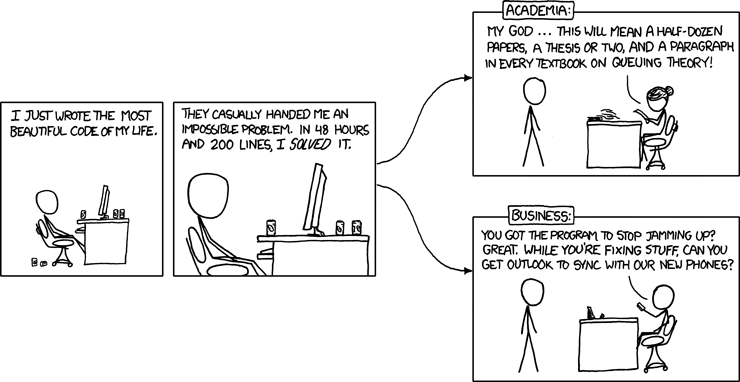One of the first things one notices after joining a math department as a graduate student is just how splintered, or to use a math term, non-continuous the academic atmosphere is. The analysis people don’t talk to the algebraists, both of whom turn there noses at at number theorists who won’t deign to talk to a discrete mathematician and everyone talks behind the back of the statisticians. As someone who throughout there entire academic career was a talented generalist, I score higher on English standardized tests than mathematics ones, instead of a specialist I found myself in the unenviable position of having to choose what area of mathematics I wanted to specialize in instead of being able to let my academic whimsy take me where it would. During my education thus far in graduate school I have found that this partitioning of mathematics has never been a help and is often an hindrance both to furthering and deepening my mathematical knowledge and to my enjoyment of mathematics. Recently there have been a couple of really good posts written on this subject that I want to share with all of you.
The first is by Doron Zeilberger who talks about the shocking state of contemporary mathematics through the lens of a recent conference he attended. The article starts
I just came back from attending the 1052nd AMS (sectional) meeting at Penn State, last weekend, and realized that the Kingdom of Mathematics is dead. Instead we have a disjoint union of narrow specialties, and people who know everything about nothing, and nothing about anything (except their very narrow acre). Not only do they know nothing besides their narrow expertise, they don’t care!
The “meeting” was not really a meeting. It was many mini-meetings! 22 of them, running in parallel and in complete oblivion of each other. All that they shared was the coffee, tea, and donuts. That’s a little reassuring that an algebraic combinatorialist has at least one thing in common with an algebraic geometer, a q-serieser, and a Heat-kernel group theorist: they all drink coffee (or tea), and eat donuts! But that’s about it.(read the rest)
The second is by Ben Tilly who left his mathematics PhD program before finishing because he just did not want a career in a single clique:
Why do mathematicians put up with this? I’ll need to describe a mathematical culture a little first. These days mathematicians are divided into little cliques of perhaps a dozen people who work on the same stuff. All of the papers you write get peer reviewed by your clique. You then make a point of reading what your clique produces and writing papers that cite theirs. Nobody outside the clique is likely to pay much attention to, or be able to easily understand, work done within the clique. Over time people do move between cliques, but this social structure is ubiquitous. Anyone who can’t accept it doesn’t remain in mathematics.
I really do love mathematics and really like a lot of the people who are in the discipline I just hope that the culture changes or I, as Ben Tilly did before me, am going to have to leave the discipline and head towards more interdisciplinary pastures where generalists are embraced instead of looked down upon.







